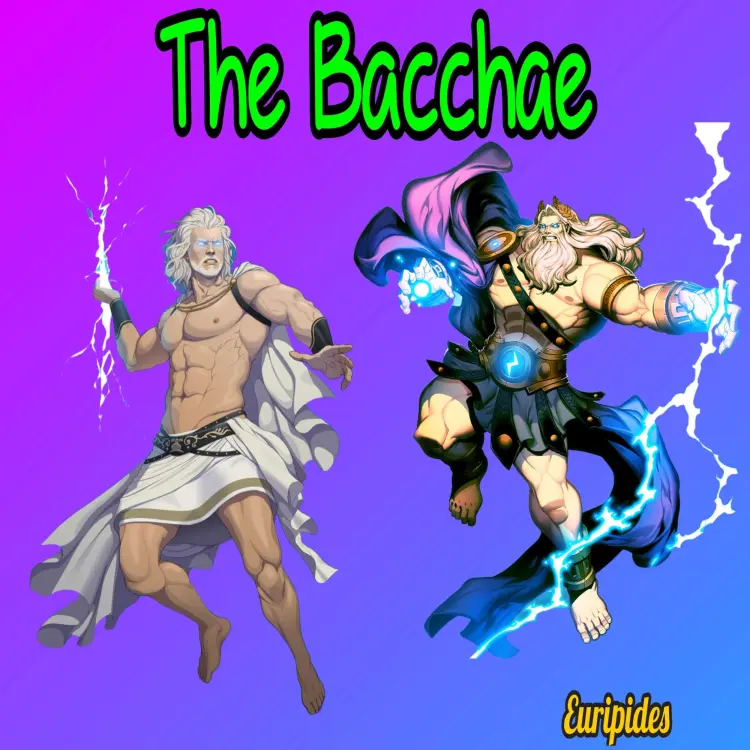
The Bacchae
Euripides
Este audiolibro no está disponible en tu territorio.
Unabridged
1 hora 35 minutos
Nota: La reproducción de los audiolibros o de las obras de audio en las respectivas plataformas, por ejemplo Spotify, puede generar gastos. Lismio no tiene ninguna influencia sobre qué audiolibros y obras de audio están disponibles en el servicio.
Algunos artículos contienen enlaces de afiliados (marcados con un asterisco *). Si hace clic en estos enlaces y compra productos, recibiremos una pequeña comisión sin coste adicional para usted. Su apoyo ayuda a mantener este sitio en funcionamiento y a seguir creando contenidos útiles. Gracias por su apoyo.
De la editorial
The Bacchae by Euripides also known as The Bacchantes is an ancient Greek tragedy, written by the Athenian playwright Euripides during his final years in Macedonia, at the court of Archelaus I of Macedon. It premiered posthumously at the Theatre of Dionysus in 405 BC as part of a tetralogy that also included Iphigeneia at Aulis and Alcmaeon in Corinth, and which Euripides' son or nephew is assumed to have directed. It won first prize in the City Dionysia festival competition.
The tragedy is based on the Greek myth of King Pentheus of Thebes and his mother Agave, and their punishment by the god Dionysus (who is Pentheus's cousin). The god Dionysus appears at the beginning of the play and proclaims that he has arrived in Thebes to avenge the slander, which has been repeated by his aunts, that he is not the son of Zeus. In response, he intends to introduce Dionysian rites into the city, and he intends to demonstrate to the king, Pentheus, and to Thebes that he was indeed born a god.[2] At the end of the play, Pentheus is torn apart by the women of Thebes and his mother Agave bears his head on a pike to her father Cadmus.
Plot:
The play begins before the palace at Thebes, with Dionysus telling the story of his birth and his reasons for visiting the city. Dionysus explains he is the son of a mortal woman, Semele, and a god, Zeus. Some in Thebes, he notes, don't believe this story. In fact, Semele's sisters-Autonoe, Agave, and Ino-claim it is a lie intended to cover up the fact that Semele became pregnant by some mortal. Dionysus reveals that he has driven the women of the city mad, including his three aunts, and has led them into the mountains to observe his ritual festivities. He has disguised himself as a mortal for the time being, but he plans to vindicate his mother by appearing before all of Thebes as a god, the son of Zeus, and establishing his permanent cult of followers.
Dionysus exits to the mountains, and the chorus (composed of the titular Bacchae) enters. They perform a choral ode in praise of Dionysus. Then Tiresias, the blind and elderly seer, appears. He calls for Cadmus, the founder and former king of Thebes. The two old men start out to join the revelry in the mountains when Cadmus' petulant young grandson Pentheus, the current king, enters. Disgusted to find the two old men in festival dress, he scolds them and orders his soldiers to arrest anyone engaging in Dionysian worship, including the mysterious "foreigner" who has introduced this worship. Pentheus intends to have him stoned to death.
The tragedy is based on the Greek myth of King Pentheus of Thebes and his mother Agave, and their punishment by the god Dionysus (who is Pentheus's cousin). The god Dionysus appears at the beginning of the play and proclaims that he has arrived in Thebes to avenge the slander, which has been repeated by his aunts, that he is not the son of Zeus. In response, he intends to introduce Dionysian rites into the city, and he intends to demonstrate to the king, Pentheus, and to Thebes that he was indeed born a god.[2] At the end of the play, Pentheus is torn apart by the women of Thebes and his mother Agave bears his head on a pike to her father Cadmus.
Plot:
The play begins before the palace at Thebes, with Dionysus telling the story of his birth and his reasons for visiting the city. Dionysus explains he is the son of a mortal woman, Semele, and a god, Zeus. Some in Thebes, he notes, don't believe this story. In fact, Semele's sisters-Autonoe, Agave, and Ino-claim it is a lie intended to cover up the fact that Semele became pregnant by some mortal. Dionysus reveals that he has driven the women of the city mad, including his three aunts, and has led them into the mountains to observe his ritual festivities. He has disguised himself as a mortal for the time being, but he plans to vindicate his mother by appearing before all of Thebes as a god, the son of Zeus, and establishing his permanent cult of followers.
Dionysus exits to the mountains, and the chorus (composed of the titular Bacchae) enters. They perform a choral ode in praise of Dionysus. Then Tiresias, the blind and elderly seer, appears. He calls for Cadmus, the founder and former king of Thebes. The two old men start out to join the revelry in the mountains when Cadmus' petulant young grandson Pentheus, the current king, enters. Disgusted to find the two old men in festival dress, he scolds them and orders his soldiers to arrest anyone engaging in Dionysian worship, including the mysterious "foreigner" who has introduced this worship. Pentheus intends to have him stoned to death.














